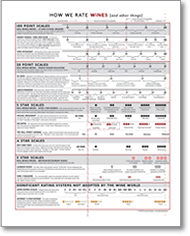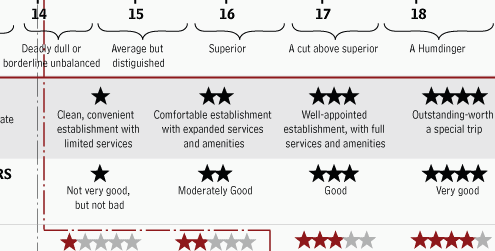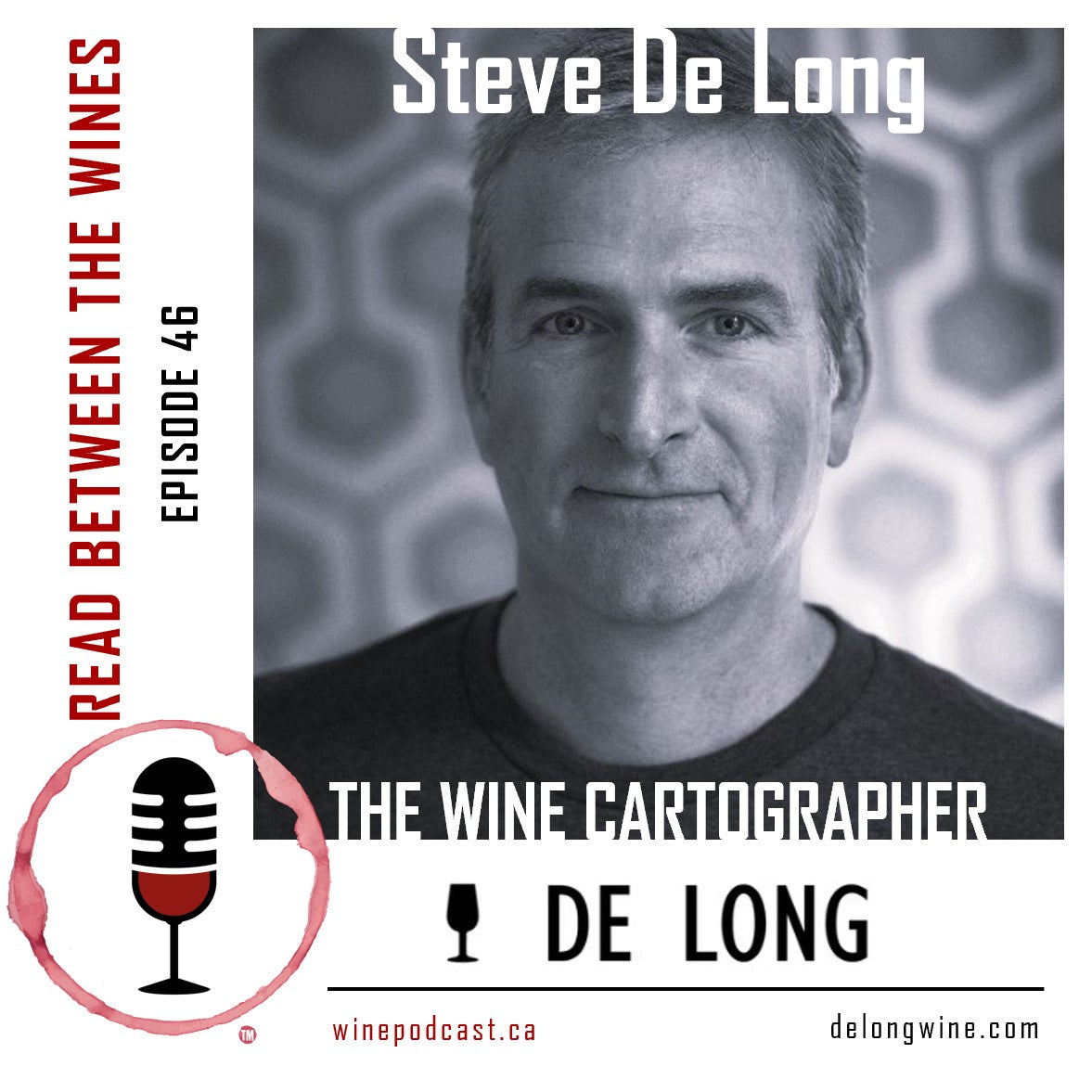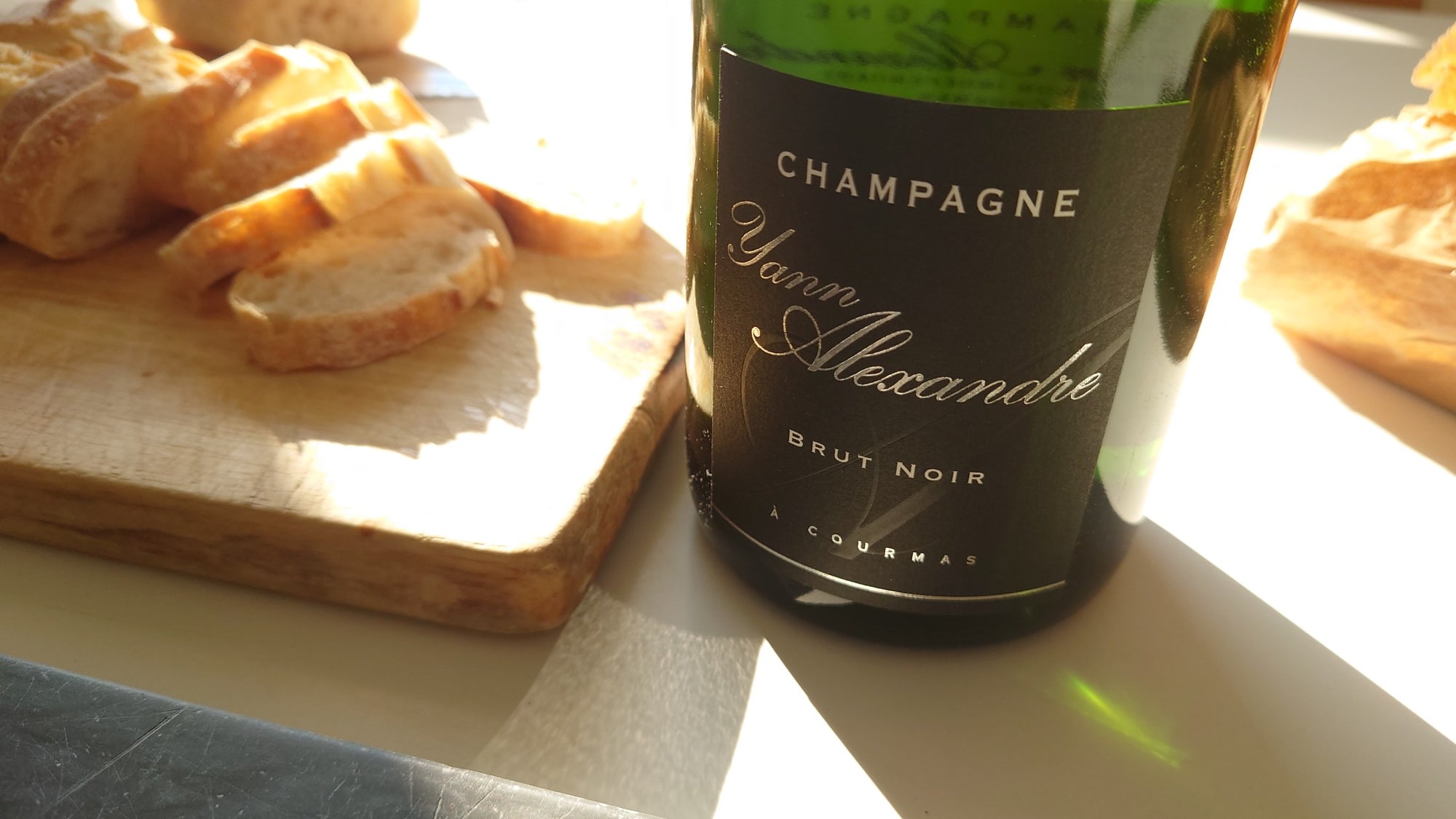Note: the bulk of this article is an accompanying chart that compares the major scoring systems now used, from 3 stars to 100 point scales (see it online here).
If you watched the movie Mondovino, you may have come away with the impression that the 100 point rating wine rating system is the root of all evil. But what about all the other wine rating systems? Are they evil as well? Of course they’re evil! But more of a necessary evil than a vast dark conspiracy. With a few prominent exceptions – Hugh Johnson, Oz Clarke, Robin Garr come to mind – all wine writers use them in one form or another. Take a look and judge for yourself.
I'm a recent convert to the 5 star system from the 100 point system. Why? I swear it has nothing to do with a recent move from the US to the UK (so I don’t want to hear any “dude, why do you hate your country?” comments). Instead, it's because I found myself spending too much time dwelling on meaningless distinctions such as: "is it an 88 or an 89, etc." I then swore off ratings altogether aside from putting one star or two stars on notes of wines I found exceptional. After doing this for a few years, the Eureka moment struck: “why not just use a 5 star system?” I like the 5 star scale because of its simplicity but don’t feel strongly enough about it to fiercely defend it.
It just seems that debates over wine rating systems resemble PC vs. Mac arguments: they just don’t go anywhere. The choice of a rating scale is just as personal as the act of rating wines; at the end of the day they’re simply useful tools and not declarations of political affiliation.




Comments
Op https://getdocumentsnow.com/nl/ kunt u een visumsticker bestellen, een biometrische verblijfsvergunning krijgen, een echt paspoort bestellen of nieuwe paspoorten krijgen. Ook kunt u uw rijbewijs verlengen of een buitenlands rijbewijs krijgen en uw rijbewijs omwisselen. Daarnaast helpen we u bij het oplossen van problemen met ingetrokken rijbewijzen of ingetrokken rijbewijzen. Wij maken digitale tachograafkaarten of bestuurderskaarten voor chauffeurs van zware vrachtwagens
The World’s Most Expensive Exclusive Wine: Domaine de la Romanee-Conti “Romanee-Conti” Considered the world’s most expensive wine, Romanee-Conti from the Democratic Republic of the Congo sells for around $19,000 per bottle. Romanee-Conti is named after a single vineyard in Burgundy’s Cote d’Or.
Why do you hate 100 point scales? I score using three terms (in order):
Okay: this covers most all bases (sometimes “alright” or “good” is used)
Delicious: this means that the wine is delicious
Stunning: this means the wine is, yes, stunning
I like the match-up of the various wine scoring scales.
I only wish your typo reproducing the UC Davis scale would be fixed.
Specifically . . .
Appearance (2)
Color (2)
Aroma & Bouquet (4)
Volatile Acidity (2)
Total Acidity (2)
Sugar (1)
Body (1)
Flavor (1)
Astringency (1)
General Quality (2)
. . . don’t add up to 20 points. They add up to 18 points.
See this recent wine blog on the inherent flaw in using numbers to assign a quality level to wine:
“The poor mathematics of wine-quality scores”
The Wine Gourd wine blog (September 3, 2018)
By David Morrison Ph.D.
URL: http://winegourd.blogspot.com/2018/09/the-poor-mathematics-of-wine-quality.html
Dude,
Why do you hate 100 point scales? I score using three terms (in order):
Okay: this covers most all bases (sometimes “alright” or “good” is used)
Delicious: this means that the wine is delicious
Stunning: this means the wine is, yes, stunning
Most of the time the wine is tasted twice with consistent notes.
Eric S. Crane
Atlanta, GA
Very clever, entertaining and enlightening (a good mix)
Hi Eric,
Now that’s a good system! Had I know this before, I could have placed you right next to Gambero Rosso. How was the Burgundy trip?
Cheers,
Steve
Hi Frank,
Thanks for the good word!
Cheers,
Steve
steve,
would i use my own money to buy it————————— if yes, tasting is over! if no, back to the beginning with the next wine!really liked your view on judging and rating systems.
taking it to the next level; i now use the cranky ol guy system…..
do i like it———————if yes, go on…..
I think the question of ratings revolves not so much around the system as it does the intent of the person making the rating and the perception of the person reading (and perhaps heeding) that rating.
I object (as do many other wine lovers I have spoken with through the years) to the idea that ratings are somehow scientific and capable of being repeated time after time by the same rater or group of raters. This is why I object in principle to Parker and The Spectator ratings — they purport to be objective and not subjective, and I believe that concept to be theoretically and practically impossible. Our noses, mouths, and brains are not laboratory instruments. Absolute numbers (95/100) tend to convey the thought that these scores are as objective as our medical numbers for blood pressure, cholesterol, or PSA — and even these will fluctuate according to the circumstances!
I have no objection to writers and others who make ratings that are clearly stated to be recommendations based on their preferences and palates. “My name is John Doe, and according to what I like and how I taste, I rate this wine as three out of four stars.”
As a wine writer who contributes to Saveur, Drinks, Sommelier News, Beverage Media and other publications, my personal objective is to get readers interested in or intrigued by whatever my topic happens to be. I want them to share an experience or perhaps reflect on a different concept or a new approach or to be amused for a few moments. Sometimes, I will write sidebars with recommendations and descriptions, but not ratings.
As a judge at wine competitions, I do use whatever rating system presented me, but I know that these ratings will not be published and that they will be blended in with those of other judges. With these ratings, we are in essence saying, “A group of people who drink a lot of wine and have some experience in tasting liked this wine or these wines best.” That’s not absolute or scientific, but in may be helpful in guiding people to try what we liked and then decide whether they like it and how much or how little.
Roger Morris